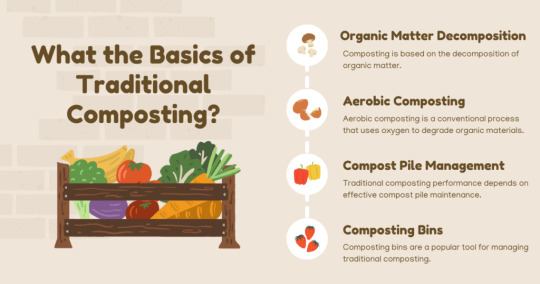#aerobiccomposting
Explore tagged Tumblr posts
Text
Understanding Top 4 Traditional Composting Methods: A Complete Guide
“The Art and Science of Traditional Composting: Rules Passed Down Through Generations”
For generations, composting has been a key component of sustainable waste management. Traditional composting methods are an efficient approach to recycle organic waste, limit landfill use, and produce nutrient-rich compost for gardening and agriculture. This blog goes into the fundamentals of traditional composting, covering organic matter breakdown, aerobic composting, compost pile management, microbial activity, and composting bins.
The Basics of Traditional Composting
Traditional composting processes are based on simple, time-tested principles. They use natural mechanisms to convert organic debris into compost, which is an important resource for enriching soil and promoting plant growth.

Organic Matter Decomposition
Composting is based on the decomposition of organic matter. It entails breaking down organic waste, such as food scraps, yard trash, and paper goods, into simpler forms using natural methods. This decomposition is mostly driven by microbial species, including bacteria, fungi, and worms, which break down complex organic components to humus.
How Decomposition Works
Decomposition begins with the addition of organic materials to a compost pile or bin. As these materials degrade, they engage in a sequence of biological events. Microbes devour organic matter, breaking it down into simpler molecules like carbon dioxide, water, and nutrient-dense compost. Moisture, temperature, and aeration are all factors that influence this process and can be controlled to increase composting efficiency.
Factors Affecting Decomposition
Several factors affect the rate of decomposition, including:
Type of Organic Material: Green materials (high in nitrogen) and brown materials (high in carbon) should be balanced for optimal composting.
Moisture Levels: Compost piles need to be kept moist, but not too wet, to support microbial activity.
Temperature: Decomposition is faster in warmer conditions. Maintaining an optimal temperature range accelerates the process.
Aeration: Regular turning of the compost pile ensures sufficient oxygen supply, which is crucial for aerobic decomposition.
Read more: Different type of Traditional Composting Techniques
To read more about what the 4 traditional composting methods are and a step by step guide towards cultivating nutrient-rich compost?
Click Here!
Visit our Website: Klimrus.in
Mail us: [email protected]
Contact Us: +91 87880 62942
#traditionalcomposting#composting#wastemanagement#organicmatter#aerobiccomposting#compostpilemanagement#microbialactivity#compostbins#decomposition#wastereduction#soilenrichment#costsavings#environmentalbenefits
0 notes